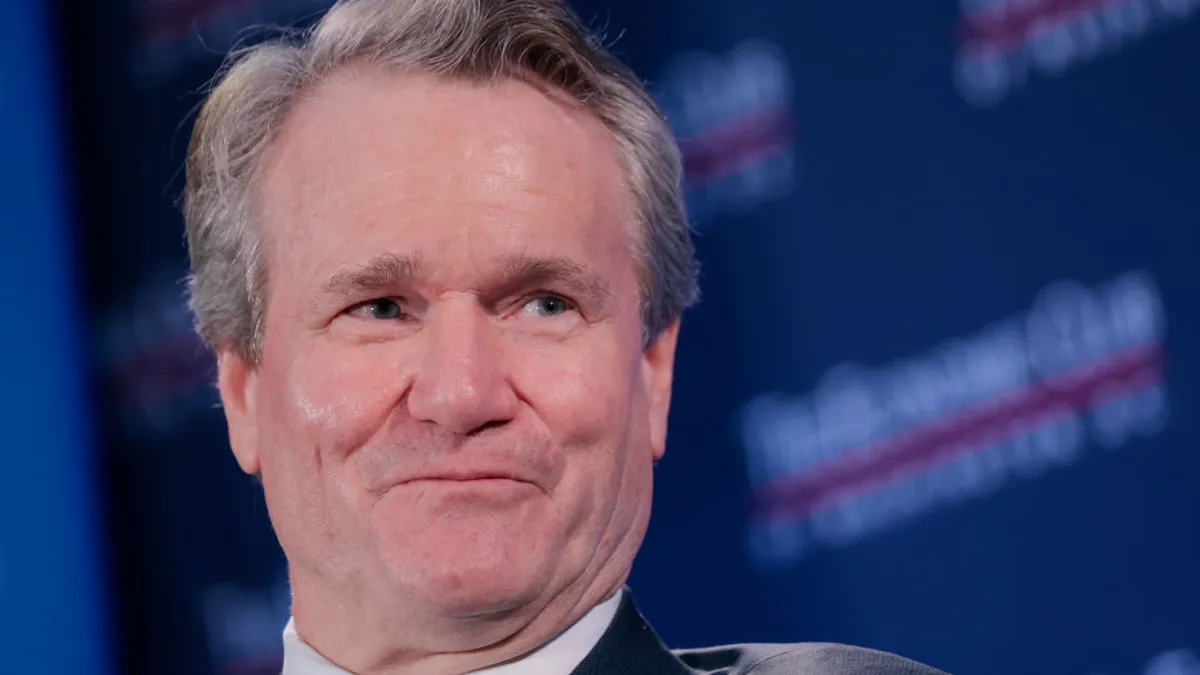Regulators have indicated they plan to pay closer attention to the way bank mergers are evaluated and approved, a move that is causing large banks to pause the hunt for potential tie-ups amid a “weird environment” for M&A, said Patrick Hanchey, a partner in Alston & Bird’s financial services and products group.
“The biggest banks in the nation should expect and do expect for it to be a lot harder for them to get past the regulatory hurdle to justify a bank merger, especially a merger of equals,” Hanchey said. “I think those are probably on hold for the foreseeable future.”
The regulators’ focus on revamping bank merger framework is an example of agency heads responding to a top-down directive, Hanchey said.
President Joe Biden issued an executive order last year requiring the Justice Department, Federal Reserve, Federal Deposit Insurance Corp. (FDIC) and Office of the Comptroller of the Currency (OCC) to update their guidelines “to provide more robust scrutiny” of mergers and acquisitions.
“As long as the current administration is in place, we're not going to see anywhere near the level of merger of equals or large splashy bank merger transactions that we've seen over the past five or six years,” Hanchey said.
It remains to be seen, however, how changes in regulators’ attitudes will impact regional and community bank deals, Hanchey said.
“The wide range between $10 billion in assets to $2 billion in assets — I do think there's a lot of wait-and-see at that level,” he said. “Is it going to change significantly? Or will cooler heads prevail and there is some sense of, ‘Yes, mergers can and do need to happen and can actually benefit communities and provide a lot of positive benefits?’”
The OCC has signaled it does not plan to impose a moratorium on mergers and will consider merger proposals on a case-by-case basis as it reviews its approval framework.
“[R]ather than being pro-merger or anti-merger, we need frameworks that are smart on mergers,” Acting Comptroller Michael Hsu told attendees of a virtual Brookings Institution event this month.
Hanchey said he doesn’t expect the regulator to approve many deals until a new framework is established.
“If you don’t really know the framework you’re working under, as a middle-tier applications analyst at the OCC, are you really going to pull the trigger on approving a transaction? It just seems unlikely to me,” Hanchey said.
Despite the regulatory uncertainty, institutions considering a merger can take steps to increase their chances for approval — such as paying close attention to their pro forma Herfindahl-Hirschman Index (HHI) numbers, Hanchey said.
“Before you've even signed a definitive agreement, go ahead and have a plan for how you're going to address any single market that comes out as being too highly concentrated,” he said.
Banks should also be proactive with their regulators, notifying them about the proposed merger before filing an application, Hanchey said.
After an initial talk with regulators, a bank may ultimately realize the deal is not worth the manpower or financial resources to attempt, Hanchey said.
“We've done that a lot, and that has resulted in some deals not happening,” he said. “In other cases, it has resulted in finding a workable solution — a deal that makes sense for both sides.”
More public hearings
A likely increase in public hearings regarding merger proposals is another factor institutions need to consider when eyeing an acquisition, Hanchey said.
More than 120 people attended a March public meeting on U.S. Bank’s proposed acquisition of MUFG Union, according to Hsu, who has said he sees value in holding such events.
During the hearing — the first merger-related public gathering bank regulators have called since BB&T and SunTrust proposed their tie-up in 2019 to form Truist, U.S. Bank CEO Andy Cecere unveiled a $100 billion community benefits plan in an effort to placate community groups that opposed the deal.
More hearings are on the horizon. Last week, regulators announced two more merger-related hearings: one for Bank of Montreal’s proposed acquisition of Bank of the West, and another regarding TD Bank’s proposed acquisition of First Horizon.
As public hearings for merger proposals become more common, it's even more pertinent to be proactive with regulators and address early the impact a deal can have on communities, Hanchey said.
“If you know that you're going to have to sit in a public forum and answer questions and be hammered by consumer groups and other groups that might not be so friendly to you, you can imagine the pressure that puts on the leadership of a bank to have their organization and their teams ready to act and show that they have a plan to address these concerns,” Hanchey said.
Firms need to be prepared to invest not only in their preparation for such deals but in community outreach, Hanchey said.
“You need to have teams in place whose mission it is to come up with the plans that are going to show that you’ve got your ducks in a row and you’re ready to serve the communities in connection with this merger,” he said. “That's your bank CEO and your board empowering leadership behind a person in charge of the process and giving them the resources they need to be successful in implementing a plan to serve the communities.
"Banks need to show that they’re taking it seriously and not just giving lip service to try to get a check of approval from a bank regulator," Hanchey added.






















